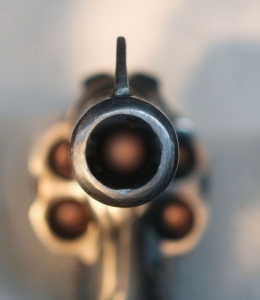Council considers buyout of guns
By Rochelle Moore
Published in News on December 15, 2016 9:57 AM

The goal of getting guns off the streets is driving the Goldsboro City Council's interest in a possible gun buyout program.
Gun buyouts, which offer cash or gift cards for weapons under a no-questions-asked policy, have taken place across the state and nation in recent years following mass shootings and other violent crimes.
The effectiveness of the programs continues to be questioned, and members of the city council have mixed views.
Goldsboro Police Chief Mike West said he believes the program will do little to reduce violent crime.
"I don't think so," West said. "Research shows that they're not as effective or as successful as they seem to be."
Because gun buyouts allow people to sell the guns anonymously, without any chance of facing a criminal charge, the program could compromise homicide investigations, West said.
"It could to some degree," West said. "There's less likely of a chance of getting a perpetrator that committed the crime. We can't go back and identify the person who gave the gun to us."
Most gun buybacks are set up at a neutral location. People are allowed to drive to the location, pop their trunk and an officer takes out the unloaded firearm and provides cash or a gift card.
After the guns are collected, officers check serial numbers to determine if they were stolen. If so, they are returned to the owner. Ballistic tests are also performed to determine if weapons were used in a crime. The testing could come with an added cost for the police department, West said.
Guns that are modified, inoperable and lack a visible serial number can be destroyed. State law requires law enforcement agencies to keep working guns or sell them to a licensed gun dealer.
West was asked by city council during a Dec. 9 work session to explore the possibility of a gun buyback program for Goldsboro. He plans to present the results at a January council meeting.
West told council that most agencies collect inoperable and old weapons and guns least likely to be used in violent crimes.
"What a lot of the agencies get are these old hunting rifles or old revolvers or relics that don't even work and have been in the county for years, and it's just an opportunity for people to turn them in and get a little money for them," West said. "It's getting guns not necessarily off the street, but it's getting them out of people's attics and closets and out from under their beds."
Cities vary in the amount offered for each weapon. In 2014, the city of Winston-Salem funded a $10,000 program through police forfeiture money collected from illegal drug activity. The city, which required people give their names, paid $75 for rifles and shotguns, $100 for handguns and $150 for assault weapons.
"I think overall in the law enforcement community, they're not as successful as we would like for them to be," West said.
"It does get guns in, but it's not getting the guns off the street that are being used in these crimes."
Money used in a gun buyback could go toward other police department needs, including overtime pay in an effort to get more cops on the streets, West said.
Councilman Antonio Williams and Councilman Bevan Foster expressed an interest in the program during the recent council meeting.
Foster said he would favor gun buybacks if the program targeted guns more likely used in crimes.
"I just know criminals are not running around with shotguns," Foster said. "I don't mind doing it, but I want to get good guns off the street."
Mayor Pro Tem Gene Aycock thought the program would attract people interested in getting money to buy a newer weapon.
"Most of them are going to be non-criminals," Aycock said. "What bothers me is . . . this guy has got a (22-caliber gun) and he turns it in and gets money for a better gun."
Councilman Mark Stevens questioned the policy that prevents criminal charges if a gun is traced to a homicide.
"We don't ask for names or we don't ask for the locations, so if you get a firearm that comes back stolen or is used in a homicide, I can't do anything to the person who turns it in," West said.
Williams criticized other members of the council for not understanding the program.
"I have to disagree with some of the other council members," Williams said. "I think they have a lack of understanding because these criminal acts are not going on in their districts.
"We need to find some ways to get some of these guns off the streets."
Councilman Bill Broadaway said he'd like to learn more about other programs in North Carolina cities, including Fayetteville.
Councilman David Ham is open to the program if buybacks are designated only for weapons typically used by criminals.
"The purpose is trying to get weapons out of the hands of people using them," Ham said. "That would be good if we would set up a program where we were getting smaller caliber weapons.
"If we're going to have just an open buyback program, I'm opposed to it."
Paul Valone, president of Grass Roots North Carolina, a Raleigh-based gun rights group, said buyback programs are futile.
"This doesn't reduce violence," Valone said. It's never reduced violence. It's a feel-good solution.
"Criminals aren't going to turn in their guns. Why would they?"
Valone said the programs are a waste of taxpayer money that would be better used for body armor or community policing. He also views the programs as giving criminals an avenue to ditch weapons used in violent crimes.
"You're essentially giving them a get out of jail free card," Valone said.
